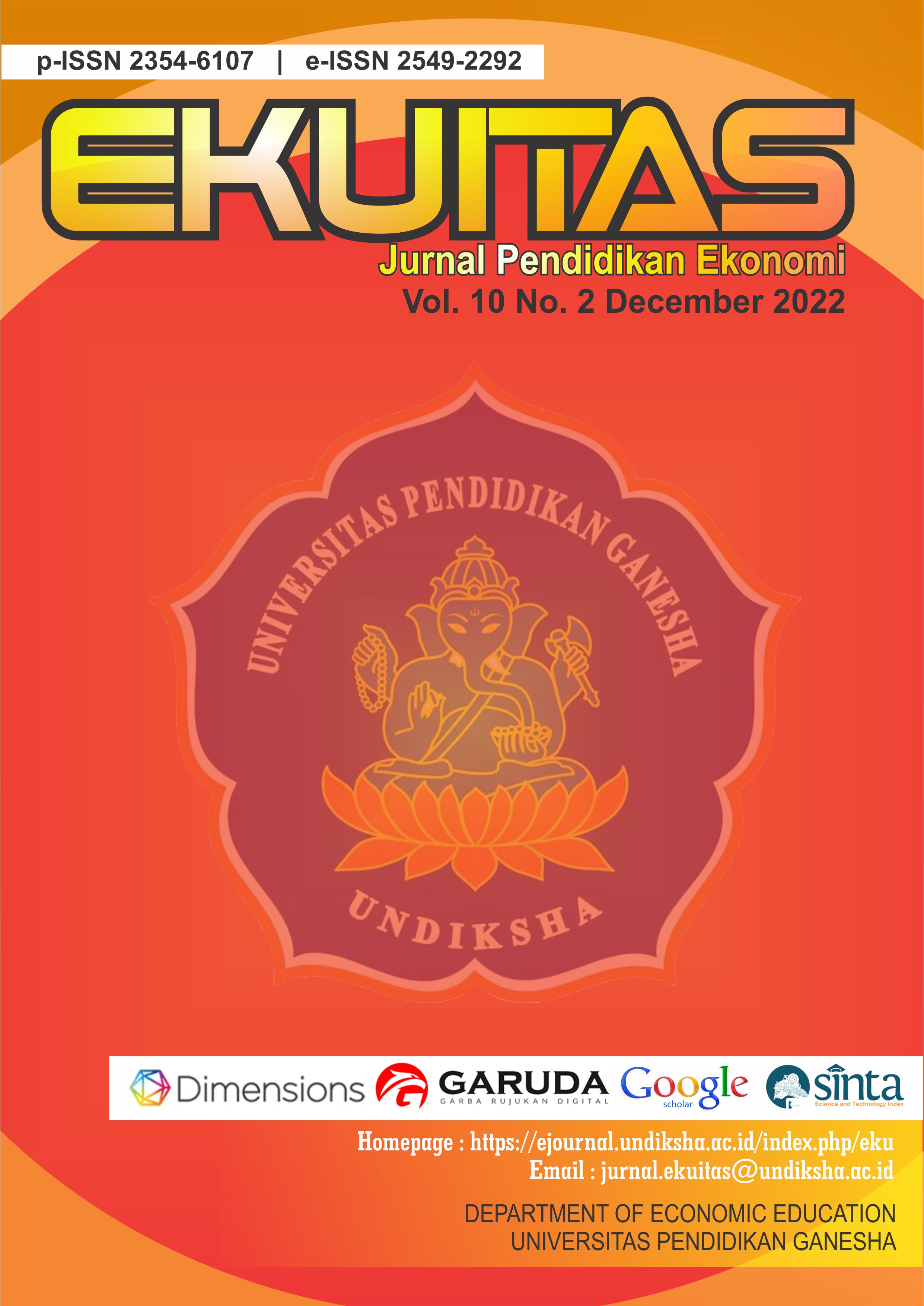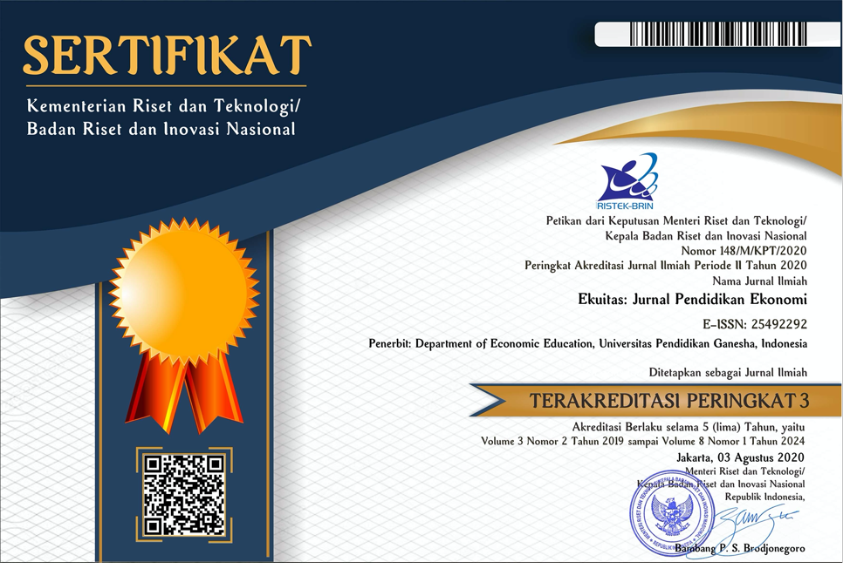Edu-Tax21: Integrasi Program Pembelajaran Pajak dengan Keterampilan TIK di Perguruan Tinggi
DOI:
https://doi.org/10.23887/ekuitas.v10i2.50191Kata Kunci:
Learning program, taxation, ICTAbstrak
This study aims to provide an effective learning system from technology-based taxation practicum. The learning videos uploaded to MOOC are the material studied in this case study research. The data taken are interviews with expert validators and also students who are taking taxation practicum. Furthermore, the results are triangulated with the value of the assignment before and after using the learning video. The results of the analysis show that using e-learning provided by publishers is not enough to help students learn tax practicum well. The e-learning content presented by publishers is still conventional, namely pdf files related to cases and also working paper files in the form of excel which can be downloaded. Students still feel confused about the flow of work. Meanwhile, after accessing the video, students feel more independent in doing e-learning tax practicum. Interaction with technology makes it easier for students to do tax practicum.
Referensi
Abbas, Y., Tjen, C., & Wicaksono, P. T. (2021). Tax Education and Tax Awareness : an Analysis on Indonesia Tax Education Program. May, 1. https://www.lpem.org/id/tax-education-and-tax-awareness-an-analysis-on-indonesian-tax-education-program/%0Ahttps://docs.google.com/viewerng/viewer?url=https://www.lpem.org/wp-content/uploads/2021/06/WP-LPEM-060_Tax_Education_and_Tax_Awareness_An-Analysis_
Adriana, P., Amalia, R., & Utami, K. (2020). Accounting ethics education in the industrial revolution 4.0: An educators perspective. Advances in Economics, Business and Management Research, 136, 21–25. https://doi.org/10.2991/aebmr.k.200415.005
Al-Htaybat, K., von Alberti-Alhtaybat, L., & Alhatabat, Z. (2018). Educating digital natives for the future: accounting educators’ evaluation of the accounting curriculum. Accounting Education, 27(4), 333–357. https://doi.org/10.1080/09639284.2018.1437758
Alm, J., & Torgler, B. (2011). Do ethics matter? Tax compliance and morality. Journal of Business Ethics, 101(4), 635–651. https://doi.org/10.1007/s10551-011-0761-9
Amalia, Y. S. (2020). Dasar-dasar Pengenalan tentang Massive Open Online Course (MOOC): Airlangga University Press.
Andreas, & Savitri, E. (2015). The effect of tax socialization, tax knowledge, expediency of tax ID number and service quality on taxpayers compliance with taxpayers awareness as mediating variables. Procedia - Social and Behavioral Sciences, 211, 163–169. https://doi.org/10.1016/j.sbspro.2015.11.024
Ario, M., & Asra, A. (2019). Pengembangan video pembelajaran materi integral pada pembelajaran flipped classroom. AKSIOMA: Jurnal Program Studi Pendidikan Matematika, 8(1), 20-31.
Aulia, S. (2020). Vocational higher accounting education in the digital era: Critical review opportunities and challenges. Advances in Social Science, Education and Humanities Research, 426, 21–26. https://doi.org/10.2991/assehr.k.200331.115
Barieyah Mat Bahari, A., & Ming Ling, L. (2009). Introducing tax education in on‐accounting curriculum in higher education: Survey evidence. Journal of Financial Reporting and Accounting, 7(1), 37–51. https://doi.org/10.1108/19852510980000640
Besley, T., & Persson, T. (2014). Why do developing countries tax so little? Journal of Economic Perspectives, 28(4), 99–120. https://doi.org/10.1257/jep.28.4.99
Darmayasa, I. N., & Aneswari, Y. R. (2015). The ethical practice of tax consultant based on local culture. Procedia - Social and Behavioral Sciences, 211(September), 142–148. https://doi.org/10.1016/j.sbspro.2015.11.021
Deloitte. (2019). The path to prosperity: Why the future of work is human. Deloitte. https://www2.deloitte.com/au/en/pages/building-lucky-country/articles/path-prosperity-future-work.html
DJP. (2016, September). Inklusi kesadaran pajak dalam pendidikan. Sadar Pajak. https://edukasi.pajak.go.id/tentang-pajak/apa.html
DJP. (2020). Pelaksanaan konfirmasi status wajib pajak dalam pemberian layanan kepada konsultan pajak. Direktorat Jenderal Pajak. https://www.pajak.go.id/index.php/id/pengumuman/pelaksanaan-konfirmasi-status-wajib-pajak-dalam-pemberian-layanan-kepada-konsultan-pajak
Faj, N., Faj, N. A., Fakhri, J., & Yusandika, A. D. (2018). Efektifitas Model Pembelajaran Quantum Teaching dengan Metode Praktikum terhadap Hasil Belajar Peserta Didik. Indonesian Journal of Science and Mathematics Education, 1(2), 135–141. http://www.ejournal.radenintan.ac.id/index.php/IJSME/article/view/2771
Frecknall-Hughes, J., Moizer, P., Doyle, E., & Summers, B. (2017). An examination of ethical influences on the work of tax practitioners. Journal of Business Ethics, 146(4), 729–745. https://doi.org/10.1007/s10551-016-3037-6
Furnham, A. (2005). Understanding the meaning of tax: Young peoples’ knowledge of the principles of taxation. Journal of Socio-Economics, 34(5), 703–713. https://doi.org/10.1016/j.socec.2005.07.014
Prihandono, Y., & Dewi, I. G. A. A. O. (2020). The role of taxpayers’ education in mediating the relationship between tax sanctions and taxpayers’ motivations to use e-filling. Journal Undiknas, 1(1), 63–75. https://journal.undiknas.ac.id/index.php/REVENUE/article/view/2669
Prihatini, P. A., & Rachmawati, N. A. (2019). Pengaruh Motivasi, Efektivitas Pembelajaran Mata Kuliah Perpajakan dan Kesempatan Kerja di Bidang Perpajakan terhadap Minat Mahasiswa Akuntansi dalam Berkarir di Bidang Perpajakan.
Putro, B. B. R. P., & Tjen, C. (2020). Analysis of Tax Education and Tax Knowledge: Survey on University Student in Indonesia. In Journal of the Australasian Tax Teachers Association (No. 044; Vol. 15, Issue 1).
Rahman, A., & Inayah, N. L. (2021). Pemahaman tax education pada penerapan inklusi kesadaran pajak di kurikulum pendidikan tinggi. UBHARA Accounting Journal, 1(28), 307–314.
Rismawati, & Jasman, J. (2014). Pengaruh Penerapan Metode Pembelajaran Kooperatif berbasis Kasus yang Berpusat pada Mahasiswa terhadap Efektivitas Pembelajaran Perpajakan. Jurnal Akuntansi, 01(02), 65–83. http://dx.doi.org/10.35906/ja001.v1i2.107
Sangster, A., Stoner, G., & Flood, B. (2020). Insights into accounting education in a COVID-19 world. Accounting Education, 29(5), 431–562. https://doi.org/10.1080/09639284.2020.1808487
Sanusi, S., Abdullah, N. H. N., Chin, L. T., Rastam, F., & Rozzani, N. (2021). Tax Awareness Among Students from Higher Learning Institutions in Malaysia: Education Area as A Moderator. International Journal of Economics and Management, 15(1), 89–102.
Saptono, P. B., & Ayudia, C. (2021). Income tax issues on the omnibus law and its implications in Indonesia. AKRUAL: Jurnal Akuntansi, 12(2), 164. https://doi.org/10.26740/jaj.v12n2.p164-178
Sarea, A., Alhadrami, A., & Taufiq-Hail, G. A.-M. (2021). COVID-19 and digitizing accounting education: empirical evidence from GCC. PSU Research Review, 5(1), 68–83. https://doi.org/10.1108/prr-10-2020-0034
Sifile, O., Kotsai, R., Mabvure, J. T., & Chavunduka, D. (2018). Effect of e-tax filing on tax compliance: A case of clients in Harare, Zimbabwe. African Journal of Business Management, 12(11), 338–342. https://doi.org/10.5897/ajbm2018.8515
Sobri, M. (2020). Efektivitas pembelajaran media e-learning berbasis web dan konvensional terhadap tingkat keberhasilan belajar mahasiswa (Studi kasus mahasiswa fakultas ekonomi Universitas Bina Darma Paembang).
Stanciu, V., & Gheorghe, M. (2017). An exploration of the accounting profession – The stream of mobile devices. Journal of Accounting and Management Information Systems, 16(3), 369–385. https://doi.org/10.24818/jamis.2017.03007
Surianti, M. (2020). Development of accounting curriculum model based on industrial revolution approach. Research Journal of Finance and Accounting, 11(2), 116–123. https://doi.org/10.7176/rjfa/11-2-12
Suryani, A. W., Helliar, C., Carter, A. J., & Medlin, J. (2018). Shunning careers in public accounting firms: The case of Indonesia. The British Accounting Review, 50(5), 463–480. https://doi.org/10.1016/j.bar.2018.05.001
Susanto, E. B., & Alimbudiono, R. S. (2021). Refining tax accounting education to improve accounting students skills and competences. Advances in Economics, Business and Management Research, 180, 65–71.
Walliman, N. (2010). Research methods: The basic. Routdelge.
Winterton, J., & Turner, J. J. (2019). Preparing graduates for work readiness: an overview and agenda. Education and Training, 61(5), 536–551. https://doi.org/10.1108/ET-03-2019-0044
Wyness, L., & Dalton, F. (2018). The value of problem-based learning in learning for sustainability: Undergraduate accounting student perspectives. Journal of Accounting Education, 45(September), 1–19. https://doi.org/10.1016/j.jaccedu.2018.09.001
Yustina, A. I., & Hertiningtyas, I. (2021). Taxation ethical issues: Perspectives of tax professionals in Indonesia. The Indonesian Journal of Accounting Research, 24(1), 20–50. https://doi.org/10.33312/ijar.503









